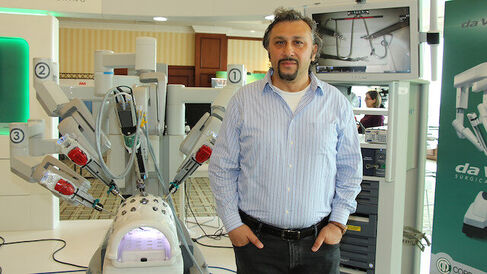to
Information Engineering Division, Engineering Department, Cambridge University

About
Physically Intelligent Robots at the Milli/Microscale
Prof. Metin Sitti
Talk: Max Planck Institute for Intelligent Systems, Stuttgart, Germany
Abstract: Intelligence of physical agents, such as robots, is not only enabled by their computational intelligence in their brain, but also by their physical intelligence encoded in their body. This presentation reports the latest bioinspired and abstract physical intelligence methods designed and implemented in small-scale robots from insect scale down to cell size. Light-powered phototactic and bacteria-driven chemo/magnetotactic microswimmers are presented at the cell-size scale towards medical applications inside the human body. At the milliscale, bioinspired soft-bodied robots with shape and stiffness programming capability, multimodal locomotion, physical adaptation in confined spaces, and multifunctionality are presented. Liquid crystal elastomer and other stimuli-responsive materials are integrated with magneto-elastic composites towards self-sensing and self-adapting millirobots. Finally, mechanical computing systems using bistable metastructures are proposed to encode physical computing in milliscale machines.
Professor Metin Sitti is the Director of the Physical Intelligence Department at Max Planck Institute for Intelligent Systems in Stuttgart, Germany. He is also a Professor at ETH Zurich, Switzerland and Koç University, Turkey as side appointments, and he was a Professor at Carnegie Mellon University (2002-2014) and a research scientist at UC Berkeley (1999-2002) in USA before moving to Europa. He received his BSc (1992) and MSc (1994) degrees from Boğaziçi University, Turkey, and PhD degree from University of Tokyo, Japan (1999). His research interests include small-scale mobile robotics, bio-inspiration, wireless medical devices, and physical intelligence. He is an IEEE Fellow. He received the Highly Cited Researcher recognition (2021, 2022), Breakthrough of the Year Award in the Falling Walls World Science Summit (2020), ERC Advanced Grant (2019), Rahmi Koç Science Medal (2018), SPIE Nanoengineering Pioneer Award (2011), and NSF CAREER Award (2005). He received over 15 best paper and video awards at major conferences. He has supervised and mentored over 70 (26 current) PhD students and 68 (15 current) postdocs, where over 50 of his group alumni are professors around the world. He is the editor-in-chief of Progress in Biomedical Engineering and Journal of Micro-Bio Robotics and associate editor in Science Advances and Extreme Mechanics Letters journals.
